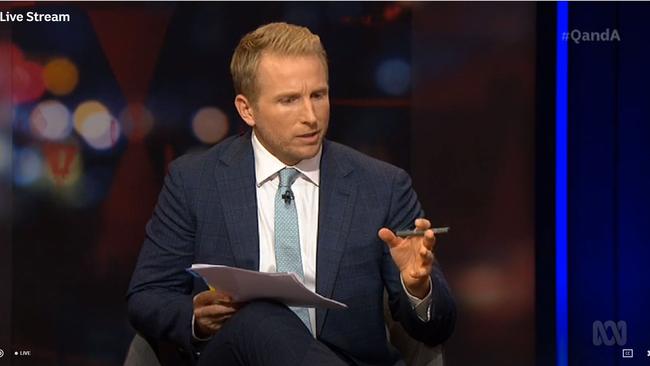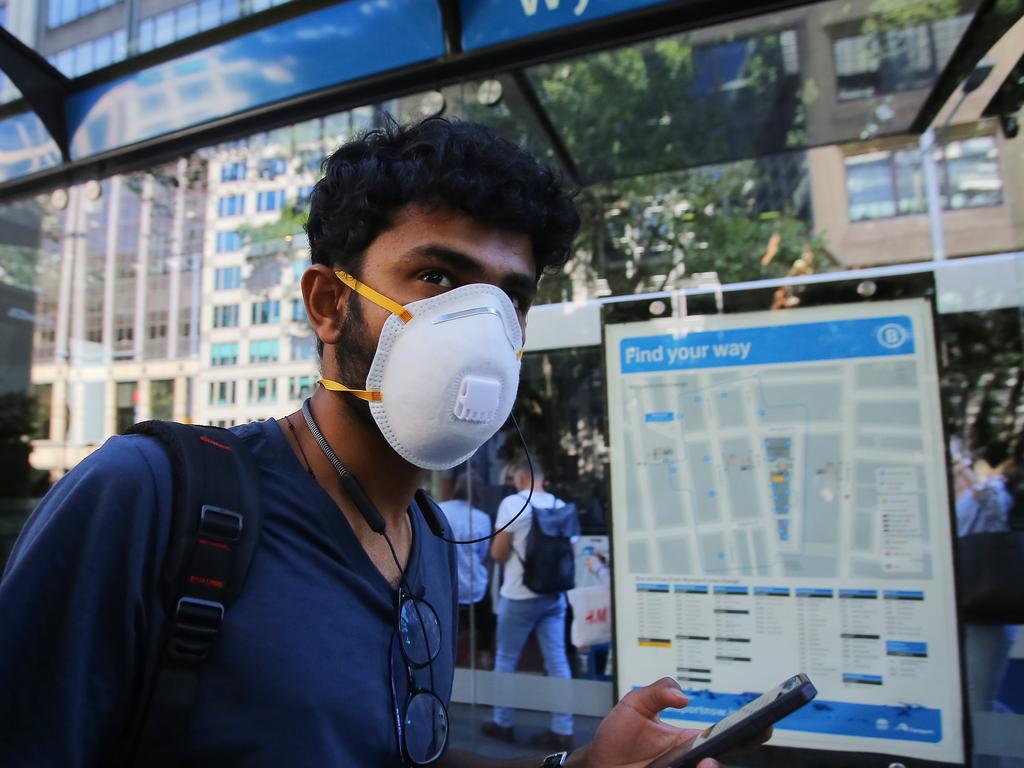Coronavirus: Dollars versus deaths ever-present pandemic problem for Q&A panel
Young people are still wondering why they have to pay for a pandemic that healthwise ‘affects them very little’.

The COVID-19 pandemic prompted a heated debate on Monday night’s Q&A program, as the panellists grappled with topics including the Government’s debt burden, protecting the country’s most vulnerable, and supporting young people through the crisis.
The program kicked off with a question from a young Australian asking how they should accept bearing the brunt of the economic crisis caused by a health crisis that in theory affects them very little.
ACTU Secretary Sally McManus argued it is not just younger people who are financially impacted by the virus, but added that an intergenerational compact should be enforced to “pay back” young people.
“It makes me think going through such a big thing like this we should be looking at … giving them some basic guarantees, guarantees around good secure jobs, guarantees around quality education, as a part of the payback of society to the next generation.
How can the government ease the financial burden on young people who will bear the brunt of this economic crisis? #QandA pic.twitter.com/wbehxJIGQ1
— QandA (@QandA) April 20, 2020
The executive chairman of the National COVID-19 co-ordination Commission, Neville Power, said once restrictions preventing the spread of the disease are eased the number of jobs needed to increase “to maximise the amount of business activity and minimise the impact on our economy.”
“I don’t think it’s about choosing on or the other and I don’t think as a society we should ever turn our back on the most vulnerable,” he said.
“We should be protecting them and we should be doing everything that we can now and into the future to rebound our economy as quickly as we can.”
‘Deaths across age spectrum’
Weighing in on the debate, Epidemiologist from The Doherty Institute, Jodie McVernon, said it is too simplistic to argue that the measures adopted to combat the virus are to save older people’s lives.
“We’ve seen severe cases in deaths in people across the age spectrum and seen whole health systems really struggle to cope,” she said.
Host Hamish Macdonald pressed Ms McVernon on the topic of government modelling, asking her whether the question of lives versus lockdowns has been considered in the government’s process.
“So the modelling that we’ve done has really been about the COVID-19 epidemic and we haven’t been addressing other causes of life lost,” Ms McVernon replied.
“So that clearly was not part of the modelling that’s been done. We’re not economic modellers.”
Do we need to start taking a more pragmatic attitude towards death? #QandA pic.twitter.com/5bOvAOq7jL
— QandA (@QandA) April 20, 2020
Lockdowns or lost lives
Economist Gigi Foster jumped into the discussion saying it “frustrates” her when people discuss the economic costs of lockdown and do not think in terms of counting lives.
“Has anyone thought about how you would get a measure of the traded lives when we lock an economy down? What are we sacrificing in terms of lives?” she said.
“If you do that kind of calculus you realise very quickly we are still potentially better off not having an economic lockdown in the first place because of the terrible effects that you see not just in a short run but in many years to come.”
Disagreeing with Ms Foster, Ms McManus noted that the lockdown measures protected healthcare workers from dying and having the county’s intensive care units overrun with patients.
The executive director of The Ethics Group, Simon Longstaff, asked Ms Foster how the cost of the lives lost during the lockdown could be offset.
“A functioning economy delivers welfare, the best of any system we’ve ever come up with as a human species. To address that by going in and having stimulus packages, of course it’s much better than if we didn’t have those stimulus packages,” she said.
Mr Power added: “Protecting people and keeping people out of hospitals will allow us to ease the restrictions much more quickly than if we had them run rampant.”
Discussions turned to whether Australian’s should trust the government and public health researchers with personal data collected from mobile phone apps.
Mr Power reiterated there are genuine safety concerns that need to be addressed, the app is to identify people after they have come into close contact with someone who has the virus.
“That’s an attempt to try and identify those people very quickly so that the virus can be eliminated as quickly as possible,” he said.
Should we trust the Australian government and public health researchers with the personal data stored on our phones? #QandA pic.twitter.com/51Cu6WLF8g
— QandA (@QandA) April 20, 2020
Ms McVernon added the most fundamental thing that is required to keep the epidemic under control is the contact tracing effort and identification contacts via the app.
“This is really to augment the existing public health activity that exist to reduce the spread of infection, identify close contacts and encourage those people to go into quarantine,” she said.
The host asked Mr Power whether the commission was supporting Virgin Australia which has been placed into voluntary administration after failing to secure a backer.
“Yes, we are,” Mr Power said.
“Our role is to provide broad business input and advice into government on what our views and concerns might be and how we think barriers and enablers can be developed in the economy to accelerate regrowth of the economy and to minimise the impact going in.”
Mr Power said the situation will rely on the government’s ability to help a public listed company and use appropriate measures to do so.
Host Macdonald asked Mr Power what the chance was of potentially living under restrictions for years if a vaccine isn’t created.
“I think we can do a lot to live with the virus as we go through a phase of having it in the background, either here in Australia or overseas, so that we can protect ourselves,” he said.
“It does mean making changes to the way we live at the moment. But I think that’s doable in exactly the same way that we had to live with polio.”
Ms Foster posited: “What if herd immunity, the development of a sort of robust system of defence, via the exposure of many people to this virus, happens to be the best way and safest way to protect the elderly and other people in our society.”
Ms McVernon said it was unclear whether a single exposure to the virus would be enough and could have an even higher death toll.
“This could cost us dearly with very limited returns,” she said.
“I think we need to understand much more about the biology of the virus before we could feel that was a safe outcome.”








To join the conversation, please log in. Don't have an account? Register
Join the conversation, you are commenting as Logout